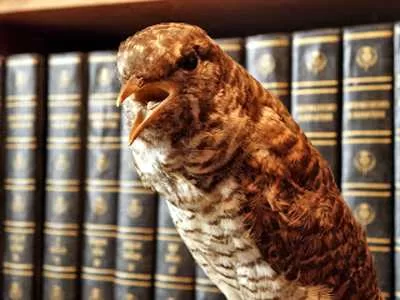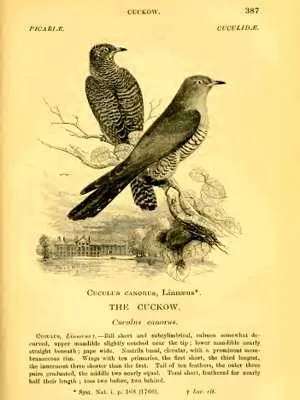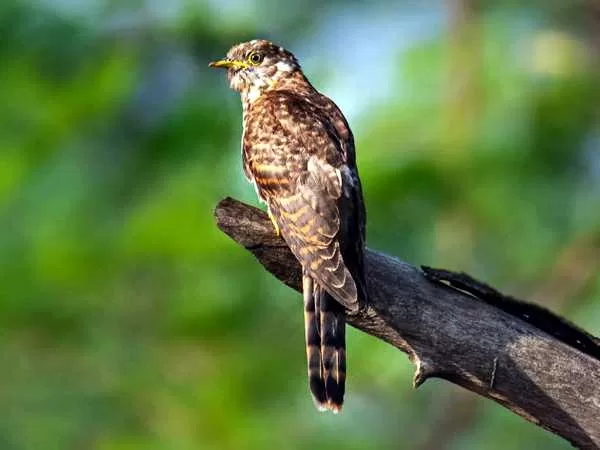“From Omens to Folklore: Unraveling the Mysteries of the Cuckoo Bird”:
The cuckoo bird has long captured human imagination, weaving its way through centuries of mythology, folklore, and cultural traditions. From ancient Greece to medieval England, this enigmatic bird has been both revered and feared, symbolizing everything from the arrival of spring to deceit and misfortune.
Let’s delve into the rich history of legends and beliefs surrounding the cuckoo and discover why this unassuming bird holds such a prominent place in our collective consciousness.
The Cuckoo in Ancient Mythology
The origins of cuckoo lore can be traced back to ancient Greece. The renowned poet Hesiod, writing in the 7th or 8th century BCE, referenced the cuckoo in his work Works and Days. He noted that the cuckoo’s first call signified the onset of spring and the ideal time for farmers to commence plowing after three days of rainfall:
“When first the cuckoo uttereth his note amid the leaves of the oak and rejoiceth men over the limitless earth…” (Works and Days, ll. 486-90)
Another significant mention comes from Aristophanes’ comedy The Birds (414 BCE). In this satirical play, two Athenians persuade birds to build a utopian city in the sky called Nephelokokkygia, or “Cloudcuckooland.” This term has since entered the modern lexicon to describe overly idealistic or fantastical concepts detached from reality. Aristophanes also emphasized the cuckoo’s association with agricultural cycles, highlighting its importance in ancient societies.

Medieval Melodies: The Cuckoo Song
Fast forward to medieval England, the cuckoo continues its association with spring and renewal. The famous “Cuckoo Song” from around 1240 joyfully announces the arrival of summer:
“Sumer is icumen in, Lhude sing cuccu”
(Summer is a-coming in, Loudly sing cuckoo)
This Middle English round remains one of the earliest known examples of polyphonic music, showcasing the enduring cultural significance of the cuckoo across centuries.
Folklore and Superstitions Across Europe
Throughout Europe, numerous superstitions and traditions have developed around the cuckoo’s call:
- Predicting the Future: In various cultures, the number of times one hears the cuckoo’s call upon first hearing it each year foretells how many years one has left to live or the number of years until marriage.
- Wealth and Prosperity: In Northern England, it’s believed that if you have money in your pocket when you hear the first cuckoo of spring and turn the coins over, you’ll have financial prosperity for the rest of the year. Conversely, having empty pockets could predict financial hardship.
- Love and Marriage: Young maidens would listen for the cuckoo’s first call and then remove their left shoe, believing they would find a hair matching that of their future husband inside.
- Health Omens: Hearing the cuckoo while lying down was considered an ill omen, potentially signaling impending illness or misfortune.
The Cuckoo’s Dual Nature: Symbolism of Deceit
While often heralded as a harbinger of spring, the cuckoo also embodies themes of deceit and trickery, primarily due to its brood parasitism. Cuckoos lay their eggs in the nests of other bird species, leaving the unsuspecting hosts to raise the cuckoo chick at the expense of their own offspring. This behavior has led to negative connotations:
- Literary References: Shakespeare alludes to this deceptive nature in King Lear, highlighting betrayal and ingratitude:
“The hedge-sparrow fed the cuckoo so long,
That it had it head bit off by it young.”
(King Lear, Act 1, Scene iv)
- Idioms and Language: The term “cuckold” originates from the cuckoo’s nesting habits, referring to a man whose wife has been unfaithful. Words like “gawk” and “gowk” (an old Scottish term for cuckoo) denote foolishness, further cementing the bird’s association with trickery.

Mystical Transformations and Legends
Intriguing myths surround the cuckoo’s lifecycle:
- Shape-Shifting Beliefs: In some European folklore, it was believed that cuckoos transformed into sparrowhawks during the winter months, explaining their sudden disappearance and reappearance with the seasons. Even Aristotle mentioned this belief in his History of Animals.
- Portents and Omens: The cuckoo’s arrival and departure were often seen as indicators of weather patterns and agricultural success, underscoring the bird’s deep connection to human survival and prosperity.
The Cuckoo in Modern Culture
Today, the cuckoo continues to captivate us:
- Timekeeping: The iconic cuckoo clock, originating from the Black Forest region in Germany, remains a beloved household item, blending functionality with the whimsical charm of the bird’s call.
- Conservation Efforts: With declining cuckoo populations in some regions due to habitat loss and climate change, conservationists are working diligently to protect and preserve this culturally significant species.
Conclusion
The cuckoo bird’s rich tapestry of myths, legends, and cultural significance showcases humanity’s longstanding fascination with the natural world. From ancient omens to modern conservation, the cuckoo continues to inspire, warn, and entertain across generations and continents. Next time you hear that familiar call echoing through the spring air, remember the myriad stories and beliefs that have soared alongside this remarkable bird throughout history.

